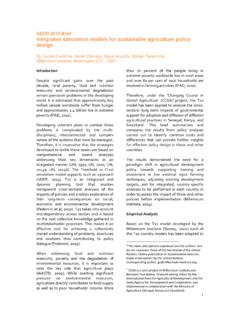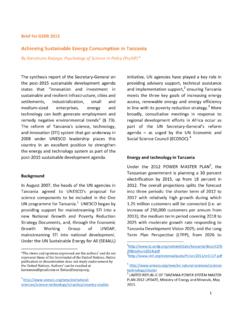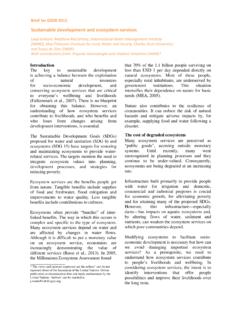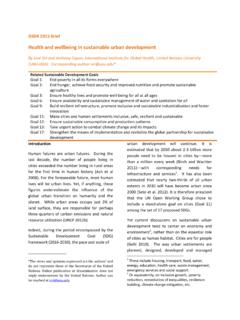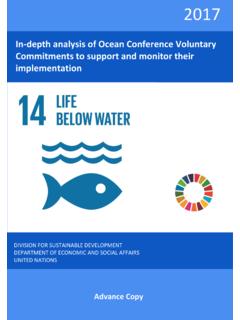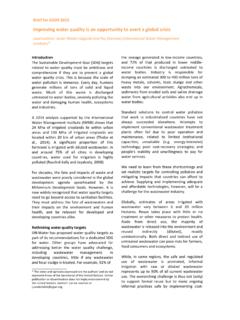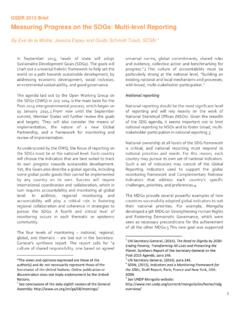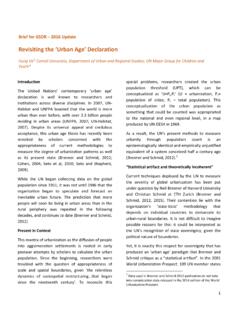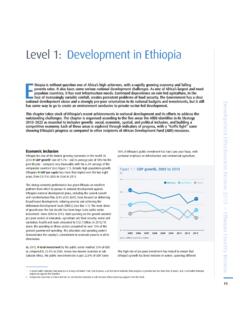Transcription of CSR and Developing Countries - United Nations
1 Issue 1 February 2007 The concept of corporate social responsibility (CSR) aims both to examine the role of business in society, and to maximise the positive societal out-comes of business practice, much of the business activity that has so far been labelled CSR has been driven by the con-cerns of investors, companies, campaign groups and consumers based in the world s richest Countries . National CSR agendas in middle and low-income Countries have been less visible internationally, and have often not been labelled CSR . The result has been CSR practices that are largely framed in rich Countries , then internationalized and transferred to other businesses and social settings through international trade, investment, and development assistance.
2 The strategic challenge for governments at national and local levels is how best to shape an agenda that has been largely market-driven and responsive to concerns of rich country the past five years or so, governments, com-panies and NGOs in many middle-and-low-income Countries have accelerated a process of adapta-CSR and Developing CountriesWhat scope for government action?What CSR is notAt its broadest, CSR can be defined as the overall contribution of business to sustaina-ble development it is in that sense that it is used here.
3 Defining corporate social respon-sibility in more detail than this remains a vexed issue. In practice views differ based on two factors. First, the extent to which impor-tance is placed on the centrality of the finan-cial business case for responsible business behaviour in defining the scope of CSR prac-tices the extent to which tangible ben-efits to companies must be demonstrable. Secondly, the extent to which government is seen to have a role in framing the agenda and how. A minimum standard for CSR might be that businesses fulfil their legal obligations or, if laws or enforcement are lacking, that they do no harm.
4 A median approach goes beyond compliance, calling for businesses to do their best, where a business case can be made, to contribute positively to sustainable development by addressing their social and environmental impacts, and potentially also through social or community investments. A maximum standard points toward the active alignment of internal business goals with externally set societal goals (those that sup-port sustainable development).This Brief is based on a background paper prepared by Halina Ward, Emma Wilson, and Lyuba Zarsky, from the International Institute for Environment and Development (IIED), and Tom Fox (UNDP).
5 Corporate social responsibilityPublic policy and public sector actors in middle and low-income Countries are increasingly confronted with issues related to Corporate Social Responsibility (CSR). This paper presents the range of opportunities that exist for them to mitigate negative impacts of CSR but also to harness its potential positive benefits for public policy. Government involvement is illustrated through examples of policy instruments and programmes promoting CSR in Developing publication of the Policy Integration and Analysis Branch of the Division for Sustainable DevelopmentUnited NationsDepartment of Economic and Social AffairsSustainable Development Innovation Briefs February 2007 tion of the developed-country-driven CSR agenda through greater direct engagement.
6 CSR movements and initiatives have emerged in Countries such as China, India, South Africa, the Philippines and Brazil, among others. Governments of some middle-income Countries facing major social challenges have explic-itly sought to engage business in meeting those challenges, as with Black Economic Empowerment in South Africa, or Presidential encouragement of busi-ness efforts to tackle poverty in the developed Countries too, there is increasing rec-ognition among companies that a one-size fits all approach to CSR in operations around the world is ineffective in responding to the business drivers of socially responsible behaviour.
7 The result has been reinvigorated focus on themes of greater importance in middle and low-income Countries including the value of sustainable local enterprise and the role of business in poverty Developing country governments should be interested in CSRT here are two broad sets of justifications for public sector actors in middle and low-income Countries to engage with CSR: defensive and proactive. The two are not mutually exclusive: a policy initiative that initially has a defensive justification may quickly become part of a proactive strategy of defensive justification relates to minimizing the potential adverse effects of CSR on local communi-ties, environments and markets when it is imposed through international supply chains and investment.
8 Governments of some major middle-income eco-nomic powerhouses such as China have undertaken a variety of initiatives to ensure that CSR practices with impact in their Countries are tailored to national economic and social of corporate conduct and certification schemes applied in international trade have become particular areas of concern. Codes of conduct implemented through supply chain requirements and enforced through audits can provide positive opportunities for niche marketing by producers and suppliers based in middle and low income Countries .
9 But they can also act as a barrier to market access. This is particularly a concern when certification requirements, or the cost of meeting supply chain requirements, harm the local small or medium -sized enterprises that represent the large majority of enterprises and account for a significant part of employment in Developing experience of business-to-business standards is that costs and benefits tend not to be equitably distributed along value chains, with costs of private standards borne by producers whereas benefits accrue to the retailer.
10 These issues are partly rooted in bargaining power disparities between producers and buyers. Similarly, assurance schemes say very lit-tle about the responsibilities of sourcing companies; the onus is on the producer to comply. Depending on the strength and durability of ties, however, between buyer and supplier, the former may have an incentive to assist the latter with compliance. Further problems arise for supplier firms that have to comply with mul-tiple, even conflicting, codes of different concern is that CSR standards imposed through supply chains can supplant domestic legisla-tion.
